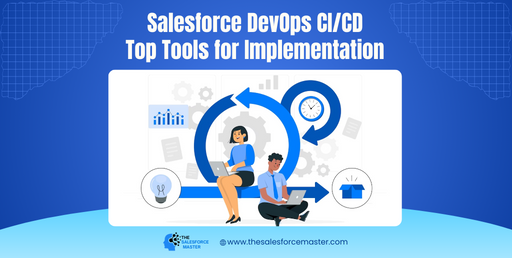
Continuous Integration and Continuous Deployment (CI/CD) are crucial for Salesforce DevOps, streamlining the development process and ensuring high-quality releases. To achieve seamless CI/CD, several tools stand out. Let’s explore the top tools for implementing CI/CD in Salesforce DevOps.
Jenkins: Jenkins is a popular open-source automation server widely used for CI/CD. With its extensive plugin ecosystem, Jenkins integrates seamlessly with Salesforce. The tool supports multiple stages of the development lifecycle, from code integration to deployment. Salesforce marketers find Jenkins invaluable for managing complex deployment pipelines.
GitHub Actions: GitHub Actions is a powerful automation tool integrated into GitHub. It allows Salesforce developers to create custom workflows for CI/CD directly within the repository. The tool’s flexibility and ease of use make it a favorite among Salesforce marketers who need efficient and reliable deployment processes.
Salesforce CLI: The Salesforce Command Line Interface (CLI) is a versatile tool for managing Salesforce orgs. It supports various DevOps tasks, including code synchronization, testing, and deployment. Salesforce marketers appreciate the CLI for its scriptable interface, enabling automated and repeatable CI/CD workflows.
CircleCI: CircleCI is a robust CI/CD platform that supports Salesforce development. It offers excellent integration capabilities, allowing seamless coordination between Salesforce and other development tools. CircleCI’s efficiency and reliability make it a preferred choice for Salesforce marketers looking to streamline their release processes.
Bitbucket Pipelines: Bitbucket Pipelines is a CI/CD service built into Bitbucket. It offers native integration with Jira, enabling comprehensive project tracking for Salesforce DevOps teams. Bitbucket Pipelines’ intuitive interface and powerful automation features help Salesforce marketers maintain high productivity and code quality.
Copado: Copado is a Salesforce-native DevOps platform designed specifically for the Salesforce ecosystem. It offers end-to-end CI/CD capabilities, from user story management to deployment. Copado’s deep integration with Salesforce makes it an indispensable tool for Salesforce marketers focusing on holistic DevOps strategies.
Gearset: Gearset is a deployment tool tailored for Salesforce. It simplifies CI/CD by providing robust features for version control, testing, and deployment. Gearset’s user-friendly interface and powerful comparison tools are highly valued by Salesforce marketers seeking efficient deployment solutions.
Benefits of Implementing CI/CD Tools in Salesforce DevOps:
Increased Deployment Speed: Implementing CI/CD tools in Salesforce DevOps significantly accelerates deployment speed. Tools like Jenkins and GitHub Actions automate repetitive tasks, reducing manual effort and time. Salesforce marketers benefit from faster release cycles, allowing them to deliver features and updates promptly.
Enhanced Code Quality: CI/CD tools enhance code quality by automating testing and validation processes. Tools like CircleCI and Bitbucket Pipelines integrate seamlessly with testing frameworks, ensuring that code changes are thoroughly vetted before deployment. This leads to more stable and reliable Salesforce applications, much to the delight of Salesforce marketers.
Improved Collaboration: CI/CD tools facilitate better collaboration among Salesforce development teams. Platforms like Copado and Gearset offer features for version control and change tracking, enabling developers to work together efficiently. Salesforce marketers can leverage these tools to ensure that projects stay on track and communication flows smoothly.
Conclusion:
Implementing the right CI/CD tools is vital for successful Salesforce DevOps. Jenkins, GitHub Actions, Salesforce CLI, CircleCI, Bitbucket Pipelines, Copado, and Gearset are some of the top choices. These tools enhance deployment speed, code quality, and team collaboration, providing significant advantages to Salesforce marketers. By integrating these tools into their workflows, Salesforce development teams can achieve more efficient and effective CI/CD processes.


